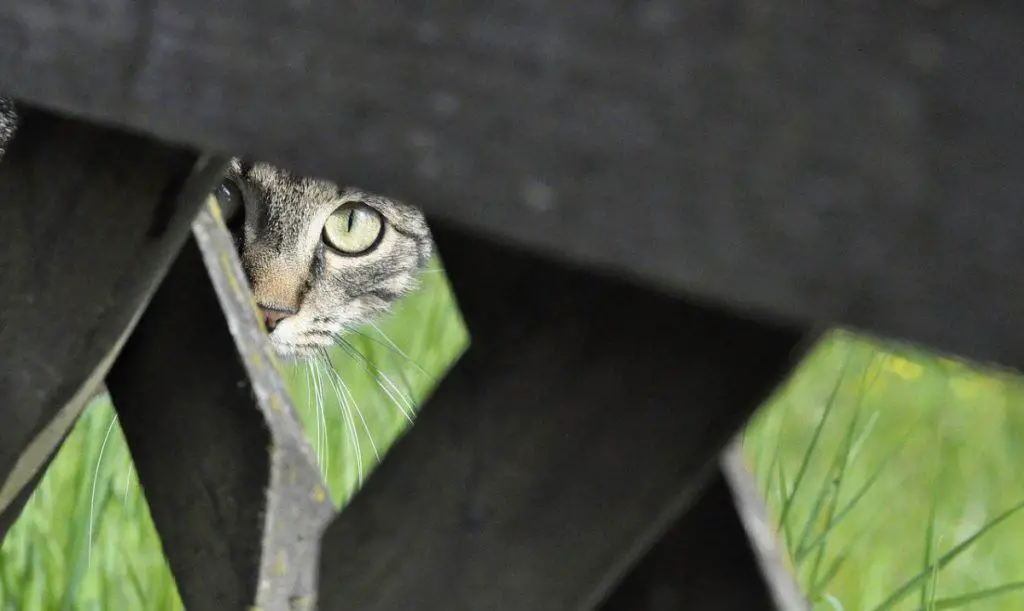Disclosure: We may earn money or products from the companies mentioned in this post.
Rabbits are natural prey animals, and as such, they are quite prone to being fearful and stressed because of their surroundings. I promise you that there will be times when your bunny is scared, so what are the signs of a scared rabbit and how can we comfort them?
You can tell when your bunny is scared by their body language. A fearful rabbit has upright alert ears, flaring nostrils, awe-stricken eyes, and generally seems tense. You’ll also notice that a scared bunny will either be hiding in a dark corner, sitting at attention ready to flee, or even stomping or thumping to warn others of the danger.
On the other hand, rabbits that feel totally safe in their environment will flop on their sides when sleeping and run and play when awake.
When you bring your new rabbit home, it is natural that they will be scared of their new environment but with time and the right behavior on your part, they will learn that their new home is a safe place to live.
What A Scared Rabbit Looks Like
This video is a really great portrayal of a scared bunny.
Why Rabbits Get Easily Scared
Rabbits get easily scared because they are prey animals. As rabbits are prey animals and because of that nature has bestowed them with a strong natural instinct to avoid danger. Their heightened senses of hearing, sight, smell, and even vibrations in the air are always alert looking for predators.
Things That Scare A Bunny
Let’s go through just some of the things and situations that rabbits are afraid of.
1. New Environment
Suppose you have changed your pet’s living environment altogether, and your rabbit is acting shy and jittery. In that case, this tells that the bunny is having difficulty adjusting to the new surroundings. A new hutch, eating bowl, new bedding, and even new toys can be the reason for his fearful behavior.
2. Constant Noise and Music
Rabbits are sensitive to sounds. Not only do they have exceptional hearing, but rabbit whiskers are so sensitive that they can feel sound vibrations in the air. Therefore unexpected or constant noise and loud music make some rabbits anxious.

3. Unusually Expectations Like Training
While training and teaching new behaviors, it is likely that your rabbit will get stressed and perhaps even scared. You need to keep in mind your rabbit’s nature when training them and not put them in a situation where you begin to appear aggressive or upset.
4. Being Approached From Above
Some rabbits get really scared when a large animal approaches them from above. If you have a new rabbit, it might be best to avoid looming over them until they get used to you.
5. Sudden Movements
Unexpected sudden movements can startle anyone, and they often downright scare a rabbit. This can include a kid running across the room or a ball being thrown across the room.
6. New Pet
Rabbits can learn to live with about any animal that they feel safe with. I’ve seen rabbit who had both cats and dogs as cuddle buddies. But just because your rabbit trusts one dog doesn’t mean that they will or should trust all dogs. If you bring a new pet into your home, you can expect that your rabbit is going to be scared of that new pet.
7. Unexpected Noise
Unexpected noises will always scare a rabbit. This could be a dropped pan, a barking dog, a broken glass, alarm clocks, etc. Rabbits will get used to common noises and no longer be scared of those sounds. I’ve seen rabbits who lived across the street from a fire station and after a few days no longer reacted to the fire trucks.
8. Aggressive Energy
Bunnies are sensitive to the energy and intent of the people and animals around them. Aggressive energy feels like the energy of predators and scares rabbits. Keep calm around your rabbit and don’t fight with your siblings or you’ll freak your bunny out.
9. New People
Rabbits bond with people and in time become perfectly relaxed around their people. However, if you bring a new person into a rabbit’s life it’s natural for the rabbit to be scared of them until they get to know them.
Rabbits recognize their people, but new people are scary.
10. Predators
As prey animals, rabbits are afraid of predators. These include snakes, hawks, owls, foxes, coyotes, and even unfamiliar dogs and cats.
Don’t forget that your bunny’s senses are more keen that yours, and even if you don’t see a predator your bunny might be smelling or hearing one in the area.
11. Their Own Shadow
Always afraid of being eaten, rabbits are naturally scared. Sometimes you’ll even see your bunny jump away from their own shadow.

10 Ways To Calm A Scared Rabbit
1. Talk to Your Rabbit
Talking to your rabbit creates an aura of trust and confidence between you and your pet.
While Rabbits don’t understand all our words, they are capable of understanding the tone of voice. Speaking in a soft, sweet, and calm manner to your pet alleviates his distress.
As you are your bunny’s person, the sound of your voice becomes the sound of comfort and safety. I bet your bunny would love to hear you sing, even if you’re not a great singer.
2. Play Soothing Music
When you are not available to talk to your rabbit, you can turn the faint soothing music on. Music can comfort a scared rabbit and also help cover up other sounds that might be making your rabbit afraid.
Loud, high-pitched, and shrill music disturb the rabbits because of the sensitivity of their ears. It is better not to use loud music near them as this can leave them startled for quite a long time.
3. Give Your Rabbit Space
Rabbits need quiet, shadowy, and cool places to sleep. Your rabbit cage should not be near an area where there is consistent activity around it. Even the slightest noise may startle him and wake him from their slumber, as a result, turn him into a sleep-deprived scared bunny.
Whether your rabbit is taking a midday nap or sleeping at night, never poke him and try to wake him unless he wants to.
4. Give Your Bunny Me Time
Some rabbits may prefer to eat off your hand, but most are introverts and prefer to eat and drink undisturbed. When it’s your rabbit’s mealtime, set down his food bowl, pour his water and then leave him alone.
This is especially important with a new bunny. Rabbits take some time to befriend humans. This tactic makes them feel comfortable and adjust to a new place.
5. Develop a Routine
Having a routine is beneficial for a rabbit as it brings tranquility and contentment to its mood. Schedule his time for eating food, playing and jumping, taking a nap and dust bath, and learning new tricks.
A consistent routine will make the rabbit happier and healthier.
On the contrary, if you introduce new activities every day, it will stress out your rabbit and make them more prone to being scared.
6. Cuddle or Don’t Cuddle
Some rabbits love to be petted and cuddled, and others hate it.
If your rabbit is struggling with fear, don’t add additional stress to their life by forcing physical affection on them.
On the other hand, if your bunny is a cuddler, settle in for the long cuddle.
If your rabbit is new to your home, they are probably not ready to cuddle yet. Instead, just sit beside your rabbit and let them come to you when they are ready.
7. Give Your Rabbit Treats on Occasion
While training your rabbit to do his chores like potty training, eating and drinking from the bowl, and sleeping in his hutch, reward them with a healthy bunny treat.
Munching on their favorite food can distract a rabbit from the things that they are afraid of.
8. Give A Cuddly Stuffed Animal
Bunnies are cuddlers and if they don’t have another live animal to cuddle with they might really enjoy having a stuffed animal as a cuddle buddy.
Just choose your stuffed animal carefully. Avoid stuffies with plastic eyes so your bunny doesn’t eat them, and look for one that has natural stuffing in case your rabbit starts chewing into the stuffed animal.
9. Introduce Your Home To Your Rabbit Gradually
Wild rabbits are great explorers, and they do not fear a bit to wander and explore nature. Domestic rabbits can be explorers in your home too, but you should limit their range when they are learning about their new home.
Allow your rabbit to become comfortable with its cage before you allow them to explore the room where its cage is located. Once they are comfortable and feel safe in that room, you can let them explore another room.
10. Provide A Safe Bed
Rabbits would prefer to sleep in a dark burrow in the ground, but that’s not really possible for your pet bunny. But you can mimic the safe feeling of a burrow by choosing a bunny bed with a small opening and sized appropriately for your bunny. Here’s a link to my recommended bunny beds.
~Stacey
